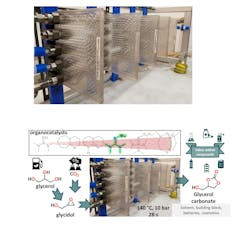In Process: Novel Method Speeds Glycerol Carbonate Production
The researchers are actively looking for a concrete partnership to bring the process to commercial scale.
Validated at pilot scale and already attracting industrial interest, researchers at the University of Liège in Belgium have developed a new process to manufacture glycerol carbonate. The chemical has long held potential for use in the green production of polymers, biolubricants, formulation agents, solvents and as an electrolyte carrier in lithium batteries.
“Despite such potential, the market for glycerol carbonate remains very limited, mainly as current production processes are slow and expensive. Our work is in the process of changing that,” explained Jean-Christophe Monbaliu, professor of organic chemistry at the university’s Center for Integrated Technology and Organic Synthesis (CiTOS).
Working with colleagues at the Center for Studies and Research on Macromolecules (CERM), Monbaliu and his team have developed a process that combines glycerol — typically a waste product derived from the biodiesel industry and cooking oil recycling — and carbon dioxide under mesofluidic conditions in the presence of an organic catalyst.
“The kinetics for all steps involved in this process are about one minute to reach completion, and only 28 seconds for the critical carbon dioxide coupling step. This reflects the holistic approach that was followed to intensify individual process steps and was a critical objective to ensure the scalability and viability of such a continuous flow approach,” he added.
Such favorable metrics, Monbaliu believes, open the potential for commercialization of the process.
Key to the reaction is the Corning advanced flow reactors used in both the experimental validation and pilot scale tests (Figure 1). Monbaliu notes that their high mixing efficiency and high heat exchange capabilities are critical in the gas-liquid reaction, while their scalability simplifies any move from pilot to commercial scale.
“The performance of the pilot scale reactor is already in an advanced stage of optimization; this is the first time that a large-scale process towards glycerol carbonate reaches such metrics in less than 30 seconds,” he added.
According to Monbaliu, the team’s work is now focused on improving the economics of the process: “It was developed with refined glycerol, which ultimately affects the overall production costs. We are currently testing this process with low-grade, unrefined/raw glycerol. The process was originally designed to have a low sensitivity to glycerol’s grade, but this has now to be demonstrated,” he said.
Despite the commercial interest, Monbaliu says the researchers are actively looking for a concrete partnership to bring the process to commercial scale.
For more see, Angewandte Chemie International Edition, 2024; DOI: 10.1002/anie.202319060.
About the Author
Seán Ottewell
Editor-at-Large
Seán Crevan Ottewell is Chemical Processing's Editor-at-Large. Seán earned his bachelor's of science degree in biochemistry at the University of Warwick and his master's in radiation biochemistry at the University of London. He served as Science Officer with the UK Department of Environment’s Chernobyl Monitoring Unit’s Food Science Radiation Unit, London. His editorial background includes assistant editor, news editor and then editor of The Chemical Engineer, the Institution of Chemical Engineers’ twice monthly technical journal. Prior to joining Chemical Processing in 2012 he was editor of European Chemical Engineer, European Process Engineer, International Power Engineer, and European Laboratory Scientist, with Setform Limited, London.
He is based in East Mayo, Republic of Ireland, where he and his wife Suzi (a maths, biology and chemistry teacher) host guests from all over the world at their holiday cottage in East Mayo.


